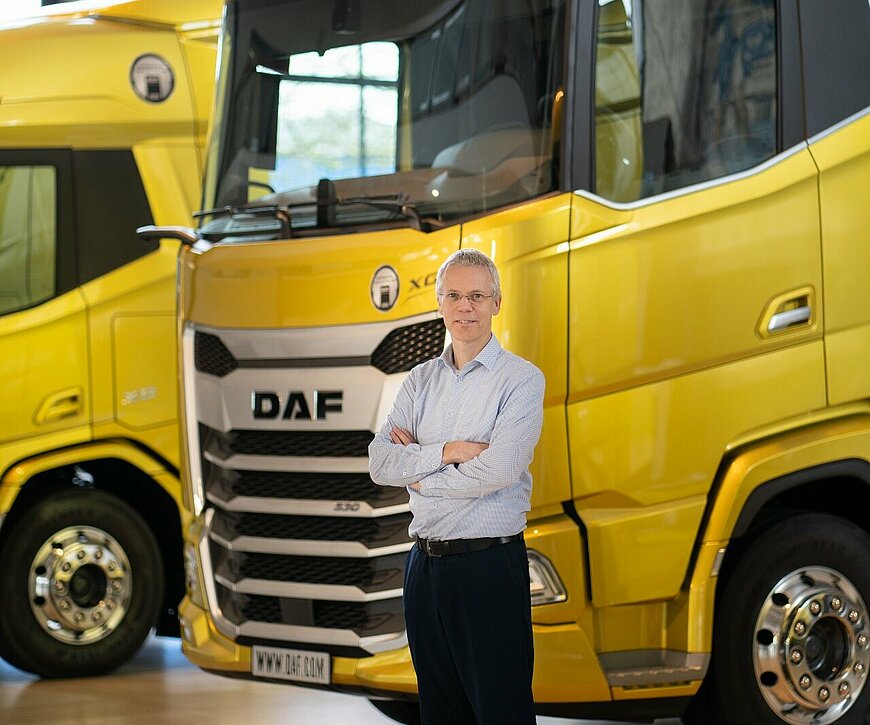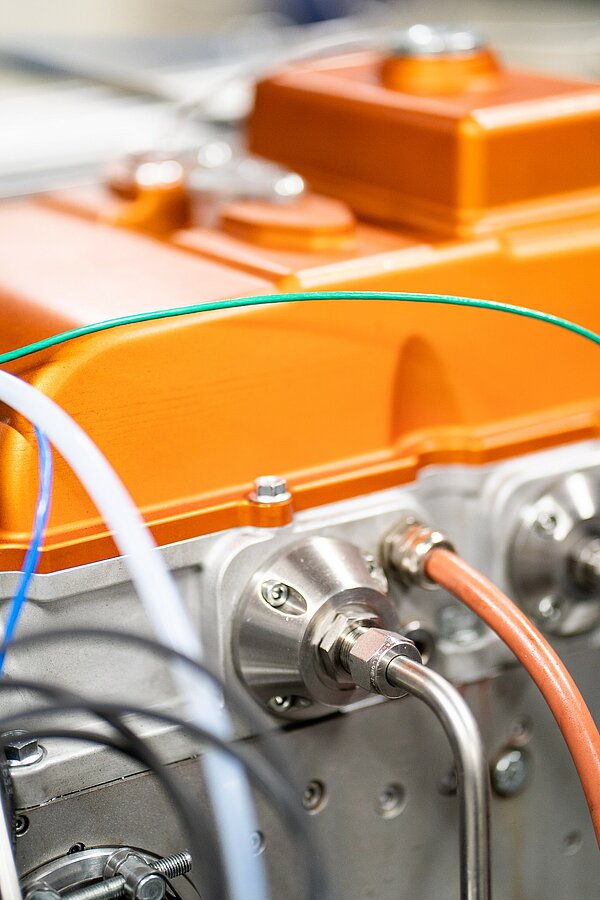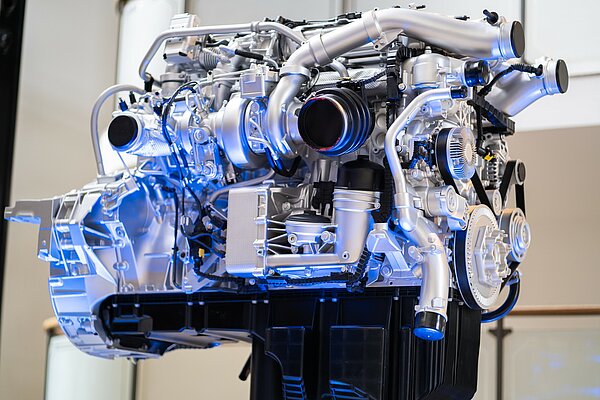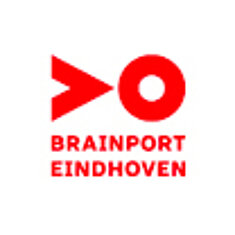Interview with Marc Horsten of DAF Trucks, partner of Green Transport Delta

‘We aim at developing the best possible hydrogen transport solution’
Please introduce yourself!
My name is Marc Horsten. I have been working for DAF for a little over twenty years, mainly within the product development department. Currently, I am Supervisor Project Management Engine Development. One of the projects my team is working on is the Green Transport Delta-Hydrogen project. We are doing this project in collaboration with quite a few Dutch companies and knowledge institutes to develop hydrogen solutions for mobile applications, such as the hydrogen combustion engine. I represent DAF in the consortium, and I am the official secretary regarding communications with the subsidy provider.
In recent decades, engine development has been dominated by emission reduction. The ultimate goal is to build a low-emission engine. By connecting an exhaust after-treatment system to the traditional diesel engine, emissions were already greatly reduced. But more needs to be done. The important thing is that when reducing emissions, you automatically address fuel consumption. When talking about fuel consumption and CO2 reduction, we have already gained tens of percent the past 20 years. However, in the next few years, we need to reduce emissions by another dozen percent. That is a huge challenge. It doesn’t suffice to only focus on adjusting the diesel engine and aerodynamics, for example. That is why we are also looking at alternative means of propulsion. We are currently already offering a full range of battery-electric vehicles and are working hard on hydrogen propulsion technologies, such as fuel cells and hydrogen combustion engines.

How will these innovations affect the Dutch citizens?
The means of transportation and the way transport is executed remain unchanged when using hydrogen combustion engines. As a result, the streetscape remains virtually the same. It is mainly the drive technology in the truck that changes. You will mostly see the difference in the infrastructure at filling stations and in the way the tanks are mounted on the truck. I hope CO2 emissions will be noticeably reduced, resulting in a better living environment.
What is the objective of the Green Transport Delta-Hydrogen pillar you are working on?
We are preparing the technology jointly with partners, so that hydrogen combustion engines can be used in trucks. This will take years. There are several technological options for creating a hydrogen combustion engine. We want to make sure that every option provides the necessary engine power in a very efficient way but is also safe to use.
The GTD-H project is a collaboration of multiple partners and there are multiple work packages. Each of the partners focuses on a particular area of interest, allowing us to take an integral approach towards hydrogen propulsion. For example, one of the options is to use hydrogen in a fuel cell. DAF is not participating in this work package, by the way. Partly because PACCAR, our parent company, is already conducting a field test with this technology in the United States. However, because we are part of the GTD-H consortium, we share our thoughts, give feedback, and stay abreast of technological innovations.
It is important to DAF that every technology sold underpins a sustainable product with a long life span. For example, all our vehicles have a minimum service life of 1.6 million kilometers. That is why it is only logical for us to use the thoroughly reliable internal combustion engine; in fact, the technology we have developed for diesel combustion engines can also be used for hydrogen combustion engines. Moreover, such hydrogen engine fits seamlessly into the overall structure of the vehicle. When you replace the diesel engine for a hydrogen engine, the drivetrain remains the same. That's a big advantage. Because we are using an existing base, the development is cost-effective. Moreover, no scarce metals are used for this option, such as the scarce metals used in fuel cells and the inevitable batteries. Hence, the hydrogen combustion engine is an excellent option.
Hydrogen also has a drawback. You have to compress about 80 kilograms of hydrogen into ultra-strong tanks under high pressure to provide a long enough driving range for carriers. We buy those tanks from external parties because you should stick to what you know.
We were able to convert an existing diesel engine into a basic hydrogen combustion engine fairly easy and built this engine into a vehicle. We, jointly with TNO, then successfully drove the first kilometers. The tests with this so-called DAF XF H2 Innovation Truck were conclusive proof that we can integrate a hydrogen combustion engine into an existing powertrain. However, the real work is only just beginning. We now have to make sure that this engine delivers the same performance as our diesel engines in terms of service life, reliability, engine power and driveability. The DAF XF H2 Innovation Truck has already been voted Innovation Truck Of The Year. This truly prestigious title, awarded by a committee of Europe's 25 most seasoned truck and transport journalists, is our crowning glory.

Why is it so important for to you to participate in this project?
We are living on a planet that we are borrowing from our children and grandchildren. That is enough reason to participate: we want to actively contribute to the future of the Netherlands. But the government also sets emission requirements for products like ours. For that reason, too, it is important that we help develop these kinds of technologies.
Although the outcome of the first tests with the hydrogen combustion engine is very positive, there is still a lot of work to be done. Of course, I cannot go into too much detail, but we, jointly with our test partner TNO, among others, are making good progress. How long will it take before the first hydrogen truck will be on the market? That will take several years. Again: we don't want to compromise on anything. A truck with a hydrogen combustion engine must still be a real DAF truck.
What parties would you like to work with to achieve success and what are the topics people can contact you for?
Infrastructure is also part of the project. Of course, we can come up with a fancy hydrogen solution, but if there is no infrastructure for refueling hydrogen, you cannot drive anywhere. Hydrogen-powered trucks and hydrogen infrastructure must be developed and implemented in parallel. Moreover, safety is paramount. That is why we need to focus on both the engine and the vehicle. We therefore remain in close contact with parties that are working on hydrogen tanks. To stay in the loop regarding all developments in that area, but also to assess how innovations in that sector match our activities and goals.
The Green Transport Delta project is a collaboration that really serves a constructive purpose. We gladly invite everyone who can help develop this new propulsion technology to share their thoughts with us. Because we can achieve more by working together than by working alone.
